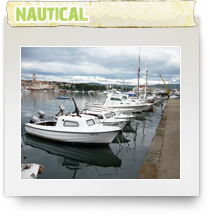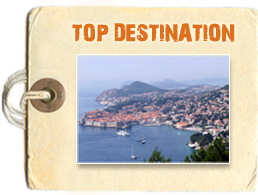
The Croatian coastline is perfect for sailing holidays. The Croatian coast, with a total length of more than 5,835kilometres, of which 4,058 are formed by islands, rocks and riffs, are surrounded by endless bays, beaches, ports, hunting ports and are products paradise for sailors. Croatia is meanwhile a trusted sail destination. Many sailors returned so far with enthusiastic tales concerning the country of the thousand islands. You frequently sail under a sheer blue sky and radiating sun with delicious sea breeze from island to island. You meet dolphins and go for anchor in azure-blue bays. With so many islands and ports, you can stop as many times as you like or sail for as long as you wish. With over 1,000 islands, sailing holidays can provide an excellent way of seeing some of the smaller perhaps even uninhabited islands that would otherwise be difficult to visit with scheduled ferry lines.
Weather
Weather conditions in the Adriatic are affected by the general weather situation in the Mediterranean and local climate conditions.
Generally speaking, light to moderate winds with few storms prevail until June. In July and August, a period of calm sets in and storms are more frequent. From September on winds are again stronger.
The bura (bora) and the jugo-siroco (jugo-scirocco) are the main winds on the Adriatic. They prevail in the winter period from September to May. The prevailing wind in the summer is the mistral. The bora is a cold and dry north-easterly wind. It blows from the continent, i.e. from the eastern side of the Adriatic towards the open sea and brings bright weather. It starts abruptly and blows in squalls toward the sea. It is strongest in the Velebit Channel and the Gulf of Trieste. Picture shows typical "bura" corridors: (1) Golf of Trieste, (2) Kvarner, (3) Velebit Channel, (4) Sibenik, (5) Split - Makarska, (6) Peljesac and (7) Dubrovnik. In the summer the bora blows as a local wind and then lasts only a few days. In the winter it may continue for six to fourteen days. The jugo is a warm, humid east-southeast wind. It is accompanied by heavy clouds and rain. It is not a sudden wind like the bora but takes 36-38 hours to develop. It blows throughout the Adriatic. In the summer it may appear as a local wind and is more frequent in the southern part of the Adriatic. Between March and June it blows in the north as well. A sudden change from the jugo to a violent bura is not unknown. The possibility must not be forgotten when the anchorage is open to the northeast.
The mistral is a local wind which blows from the sea, mostly in the summer. It usually starts between 10 and 11 in the morning and reaches its greatest strength between 2 and 3 in the afternoon to die down at sunset. It brings good weather. It is usually accompanied by white clouds.
Other winds
The burin, a north-easterly, blows in the summer from the mainland.
The tramontana is a type of bora; it is a northerly.
Another type of bora is the easterly levante.
Pulenat blows from west and lebic from south-west.The nevera, a violent westerly, comes as a storm or squall. In the summer months, storms in the Adriatic are sudden and violent and produce a short-lasting swell. The Adriatic storms have an advantage: they do not last long and some of them leave behind pleasantly cool air.
During periods of high pressure, the Adriatic also has the classical rhythm of winds: winds from the land during the night and from the sea during the day.
Weather reports
The coastal radio stations broadcast weather reports in Croatian and English several times a day. The reports include a general weather situation report, messages and the forecast for the following 24 hours.
Weather reports are broadcast at the following times (in UTC; UTC + 1 h = CET; CET + 1 h = CE summer time):
Rijeka Radio VHF Channel 24 - 05.35 14.35 19.35
Split Radio VHF Channels 21, 23, 07, 28 - 05.45 12.45 19.45
Dubrovnik Radio VHF Channels 04, 07 - 06.25 13.20 21.20
There are three coastal radio stations on the Croatian coast, which operate the radio communications service (telephone calls) and broadcast weather reports and warning announcements.
The coastal radio stations operate from 0 to 24 hours on the following VHF channels:
Rijeka Radio (9AR) channels 16, 24, 20 4
Split Radio (9AS) channels 16, 21, 23, 07, 70, 81 ,
Dubrovnik Radio (9AD) channels 16, 07, 24.
NAVTEX - Split Radio (9AS) B1 Ident.= Q , Freq.=518 kHz, Range=85 Nm, Time (UTC) 02.40 06.40 10.40 14.40 18.40 22.40 , Language=English
Each coastal radio station has transmitting and receiving stations on several locations. If contact is not established on one of the channels, other channels should be tried.
Harbourmaster’s offices can usually be contacted on VHF Channel 10, marinas on Channel 17.
Nautical warning messages with information on obstacles to navigation, lighthouse failures, prohibited areas, etc., are broadcast by coastal radio stations after the weather report.
Vessels may sail and stay in the coastal seas, rivers and lakes of the Republic of Croatia if they obtain authorization. Foreign sport rowing and sailing vessels up to 3 m length, and motor boats up to 3 m length with a motor up to 4 kW may sail and stay in coastal waters, rivers and lakes without authorization.
Entry by sea in a boat or yacht
Definition: boat is an open sports boat (e.g. dinghy, a rubber boat) which does not have sleeping facilities. A yacht is a boat with a covered cabin.
If the owner or master of a foreign vessel wishes to sail and stay in coastal waters, rivers and lakes, after entering the coastal sea, river or lake he must take the shortest route to the nearest port or harbour open to international traffic, register his arrival with the authorized body in that harbour and apply for authorization to sail.
International maritime boarder crossings: Permanent Umag, Porec, Rovinj, Pula, Rasa-Brsica, Rijeka, Mali Losinj, Senj, Zadar, Sibenik, Split, Ploce, Metkovic, Korcula and Dubrovnik. Seasonal (open from 1 April to 30 October) Novigrad, Sali, Bozava, Ravni Zakanj (Kornati), Ubli (Lastovo), Komiza (Vis), Vis (Vis) and Hvar.
If upon entering Croatian waters a vessel cannot reach a port open to international traffic because of "force major", it must register as soon as possible at the nearest harbourmaster's office or its branch offices.
A valid passport is required for entering Croatia. West European citizens can enter the country with just an identity card. Visitors travelling with passport can stay for up to three months. For a longer stay, apply to the local authorities. Visitors entering the country with an identity card can stay for up to 30 days. Engagement in professional activity in Croatia is subject to official authorization.
Persons who during their stay in Croatia live on board of the yacht are required, in addition to registering the yacht, at the harbourmaster’s office, to register with the police. This can be done in a marina, travel agency, hotel or police station (the relevant information can be obtained from the harbourmaster’s office). All persons who have registered with the police are issued with a registration card.
Failure to obtain a registration card can cause difficulties. (Persons who stay overnight is a hotel or camping ground will be issued the registration card automatically when checking in at the reception desk).
The master of a vessel must immediately after landing in a port or harbour register with the border police or the nearest police administration or station every person who is on the vessel without a valid passport. The master of the vessel must not allow a person without a valid passport to disembark in the port or harbour without authorization of the border police. If the vessel stopped outside a border crossing due to higher forces, the master must immediately register the persons who disembarked and boarded with the nearest police administration or station. Crew members may not leave the area of the border crossing before submitting to the stipulated border control.
Yacht masters certificate
When navigating in Croatian waters, skippers must have a yacht master’s certificate (or navigation license), issued according to the regulations pertaining to navigation in similar waters in their country of origin.
Navigation licenses obtained by foreigners in Croatia are recognized in Croatia but not in their country of origin.
Licenses issued by the authorities of the former Yugoslavia have to be reissued by the competent authority.
Skippers who do not have a yacht master’s certificate (coastal), can be given the navigation test by the harbourmaster (against payment), in which they will have to prove their knowledge of rules of the road, meteorology, navigation and seamanship. If they pass the test, they will be issued with a license, the validity of which is limited to the duration of their stay in Croatia.
(Skippers who do not possess a navigation license can be prosecuted; moreover, they may lose their insurance cover in case of an accident.)
Boat Equipment
There are no regulations concerning the equipment of boats navigating in coastal waters. Foreign yachts must therefore observe regulations valid in their country of origin.
According to an earlier regulation, which also obtained for foreign yachts navigating in Croatian waters, the following equipment was mandatory:
an anchor with chain or rope (at least 30 m long);
at least 2 mooring ropes (each at least 10 m long);
two oars or paddles (for small boats);
a hand pump or bucket and dipper;
six red hand flares and two boxes of matches or correspondin distress signalling equipment (in waterproof wrapping);
a rear-view mirror (if pulling a water-skier).
It is advisable to equip the boat with sufficiently heavy anchors enough to secure and mooring rope that is long and strong enough to secure the boat in all weather conditions. It must also be borne in mind that in some ports the rings and bollards are wide apart, which makes long ropes indispensable.
The first-aid kit should be shacked and renewed every year. In hot weather, sticking plasters can lose their adhesiveness and medicines their effectiveness (the expiry date on the package is, as a rule, designed only for moderate northern latitudes!)
Radio Telephones
For reasons of safety at sea and ease of communication it is advisable to have a VHF radio telephone on board. The dense network of radio stations on the Croatian coast makes it possible to establish contact (if geologically possible) with a land station from all points in the coastal waters.
Radio equipment may be used only with a license issued in the owner’s country of origin. Operating a radio station at sea without a license is regarded by all authorities in the world as radio piracy. The use of mobile telephones is legal in Croatia. The international D1 or D2 network can be used.





